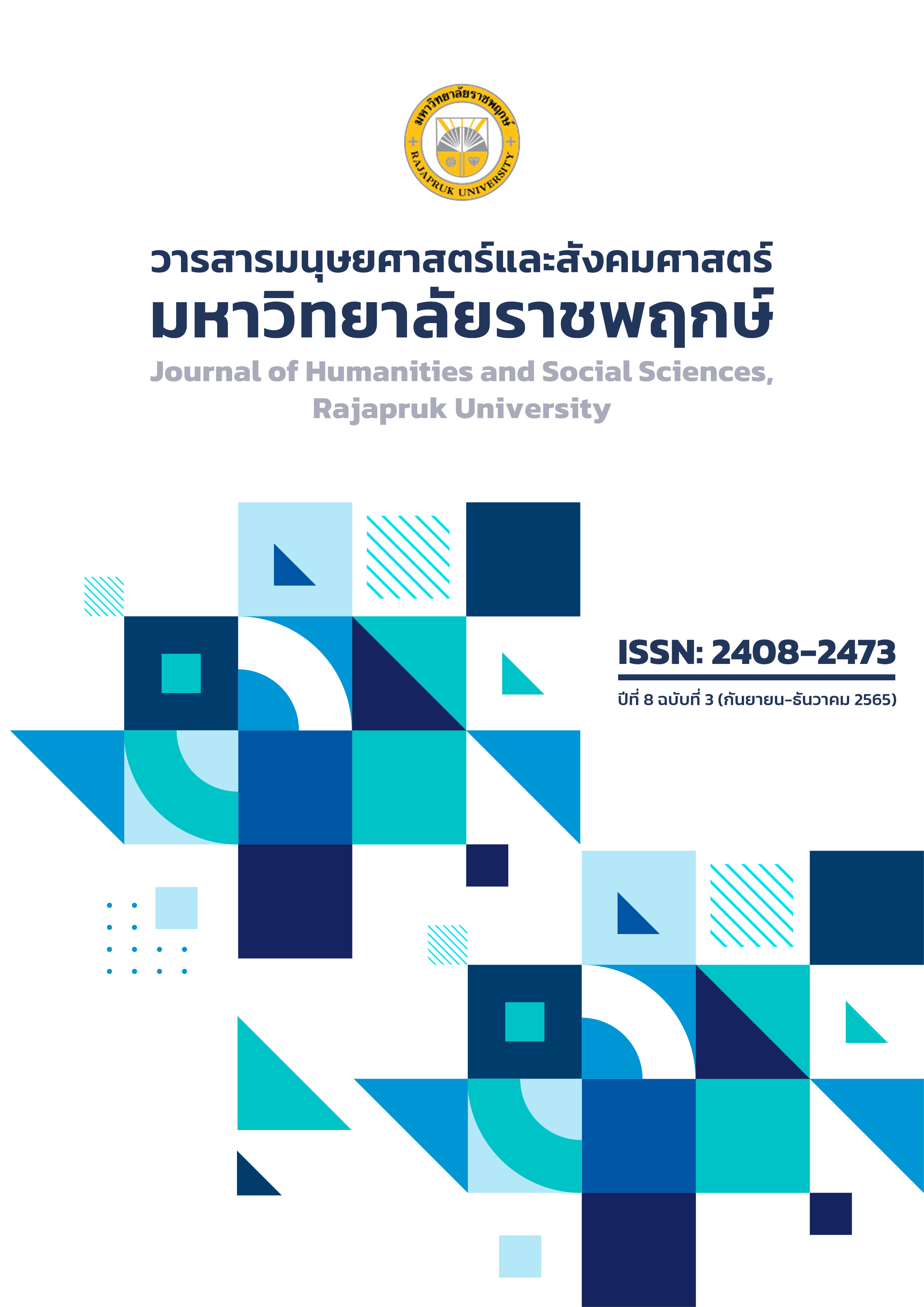Tourist demand towards Thai Song Dam Ethnic Tourism Central Province Group
Main Article Content
Abstract
This research aims to: 1) Study the personal attributes and behavior of tourists as well as their needs towards ‘Thai Song Dam’ ethnic tourism in the Central Provinces region. 2) Compare the needs of tourists towards ‘Thai Song Dam’ ethnic tourism of the Central Provinces region, classified by the tourists’ personal characteristics, and behaviors, and 3) Study the relationship between personal attributes and travel behavior of Thai Tourists. Focus on the ‘Thai Song Dam’ ethnic tourism attractions of the central provinces region. The research collected information from 400 Thai tourists who traveled to the central provinces region and visited the ‘Thai Song Dam’ ethnic tourism attractions. The methodology used for this research was data collection from questionnaires. The data were analyzed with statistical analysis for frequency, mean, standard deviation, t-test F-test, and LSD Square and Cramer's-V values.
The results showed that: 1) The majority of tourists are male aged between 20-29 years old with education below a bachelor’s degree, self-employed, single with a monthly income between 15,001-20,000 Baht, and domicile in the central/perimeter regions of Thailand. Thai tourists travel with the intention of rest and relaxation. They travel with families and relatives during Saturday-Sunday and public holidays. Their total trip average expenses are less than 2,000 Baht. The majority travel within Phetchaburi Province in groups of 4-5 people and make a trip in less than 3 months/time. Thai tourists like local cultural attractions and they search for travel resources from online media. There is a demand from Thai tourists for promotion guidelines for ‘Thai Song Dam’ ethnic tourism of the central provinces region. Overall the average of the highest level of demand was the process of organizing ethnic tourism activities. The average is also at a high level on product aspects, price aspects, distribution channels, marketing promotions, sales personnel, tourism attractions, business cooperation, and ethnic tourism promotion by the government. 2) The various personal attributes and behaviors of tourists have a different levels of demand towards promotion guidelines of the ‘Thai Song Dam’ ethnic tourism of the central provinces region. And 3) Thai tourists' personal attributes have related to low to medium level of Thai tourism behavior towards ‘Thai Song Dam’ ethnic tourism in the central provinces region.
Article Details
References
กรมการท่องเที่ยว กระทรวงการท่องเที่ยวและกีฬา. (2562). แผนพัฒนาการท่องเที่ยวแห่งชาติพ.ศ.2560-2564. กรุงเทพฯ: กรมการท่องเที่ยว กระทรวงการท่องเที่ยวและกีฬา.
จรัสนันท์ สิทธิเจริญ. (2555). พฤติกรรมการท่องเที่ยวในภาคเหนือของนักท่องเที่ยวชาวไทย. วิทยานิพนธ์ปริญญาบริหารธุรกิจมหาบัณฑิต บัณฑิตวิทยาลัยมหาวิทยาลัยเชียงใหม่.
ชุณษิตา นาคภพ. (2561). รูปแบบการจัดการท่องเที่ยวเชิงวัฒนธรรมแบบมีส่วนร่วมของชุมชนเกยไชย อำเภอชุมแสง จังหวัดนครสวรรค์. มหาวิทยาลัยราชภัฏนครสวรรค์.
ธนณัฎฐ์ โชคปรีดาพานิช. (2562). แนวทางในการพัฒนาสมรรถนะพื้นฐานอาชีพผู้นำเที่ยวไทยที่สอดคล้องตามความต้องการของอุตสาหกรรมท่องเที่ยวไทย. ศิลปศาสตรมหาบัณฑิต.การจัดการการท่องเที่ยวแบบบูรณาการ สถาบันบัณฑิตพัฒนบริหารศาสตร์.
ปาริฉัตร อิ้งจะนิล. (2558). พฤติกรรมของนักทองเที่ยวชาวไทยตอการทองเที่ยวเชิงอนุรักษ์ใน รูปแบบตลาดเก่า กรณีศึกษา ตลาดคลองสวน 100 ปี จังหวัดสมุทรปราการ. การศึกษา อิสระปริญญาบริหารธุรกิจมหาบัณฑิต สาขาการจัดการการท่องเที่ยว มหาวิทยาลัยขอนแก่น.
รชาดา เครือทิวา. (2555). แนวทางการพัฒนาการท่องเที่ยวชุมชนโดยการมีส่วนร่วมของผู้มีส่วนได้ส่วนเสียในจังหวัดอ่างทอง. สถาบันการพลศึกษา: อ่างทอง.
สำนักงานคณะกรรมการพัฒนาเศรษฐกิจและสังคมแห่งชาติ. (2559). แผนพัฒนาเศรษฐกิจและสังคมแห่งชาติ ฉบับที่ 12. กรุงเทพฯ: สำนักงานคณะกรรมการพัฒนาเศรษฐกิจและสังคมแห่งชาติ.
Schliesinger, J. (2001). Tai Group of Thailand, Volume 1: Introduction and overview. Bangkok: White Lotus Press.


